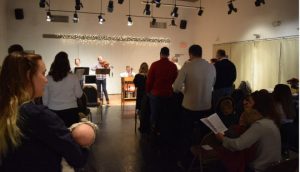I am a creature of habit. Even my adoption of new technology is habitual. At work, every time we plan something, I ask how we can do it better. Then again, I load and unload the dishwasher just so. I am brand-loyal in my consumerism, and I rely on tried-and-true recipes to get through the week’s meal preparation. My comfort with habits is why I have been drawn to ritual and tradition as markers of habits from the past. Quarantine has forced me to rethink habits, especially those without meaning or the meaning of which is lost to me.
Before taking on a deeper example, let’s take morning coffee. Before quarantine, I drank something like 16 ounces and often got more later in the day. Life was a push, and I used caffeine to help me. Now, I drink more like 12 ounces in the morning, and it takes me all morning. I start my day later and slower even with work; I also tend to lose track of my cup. By late afternoon, I am tired, but it is a type of tiredness that caffeine does not touch. I do miss running to Wawa, though.
On a deeper level, however, how we greet each other and what we do to help someone else have changed deeply. I used to think the best way to help someone was to stop, make eye contact, and converse or to offer to carry something someone seemed burdened with. Now, I wear a mask so that I don’t spread particulates that may or may not have the novel coronavirus.
In fact, I was wearing a mask just to make the point that wearing a mask increased others’ safety. It goes without saying that greeting people with six feet of distance is more awkward than a pat-on-the-back hug or a stiff handshake. We now maintain an artificial respect for others' personal space in a way we never did before. What concern for health and for the prevention of the spread of COVID-19 introduced to our interactions could be helpful in our personal relations once those concerns go away. Perhaps we should keep some of what it means to have space between us so that we do not cross personal boundaries which we might otherwise have taken for granted in the past.
The ancient rabbis had a concept of personal space known as dalet amot (four cubits), which roughly equates to six feet. So many of the rules of Shabbat do not apply until you travel past that four-cubit, six-foot limit. So much of my thinking about Shabbat has been about it being a sacred place in time; suddenly, I understand how it is a sacred place in space.
What I do past six feet really matters. Leaving my house takes preparation and conscious decision making (as it did for the rabbinic world on Shabbat). I also find that I need to go out, take a walk, breathe fresh air, and connect with the world around me in ways that my computer screen cannot replace. In recognizing these changes, I find so much more meaning to Shabbat. I find that my old habits of Shabbat observance often kept me somewhat isolated, and now I find that isolation to be an incredible expression of not having an impact on the world around me. I simply cease to go beyond my space even at home.
A much later group of rabbis in the 19th century were masters of mussar, an ethical tradition that sought to inculcate better habits. Just as I learned to make a habit of asking what we can do better, we can take on habits that help us overcome challenges, or give ourselves the space we need, or turn our attention to others. My life has been enriched by living with a ritual calendar that helps me navigate time, mark seasons, and celebrate passages. Now, it is time for me to do the same with space: to make my own space, the space between us, and our public spaces areas of meaning, appreciation, and opportunity. I plan on making it a new habit. I hope you will join me.
About Rabbi Jeremy Winaker
Rabbi Jeremy Winaker is the executive director of the Greater Philadelphia Hillel Network, responsible for West Chester University, Haverford, Bryn Mawr, and other area colleges. He is the former head of school at the Albert Einstein Academy in Wilmington and was the senior Jewish educator at the Kristol Hillel Center at the University of Delaware for four years. Rabbi Winaker lives in Delaware with his wife and three children.


Comments